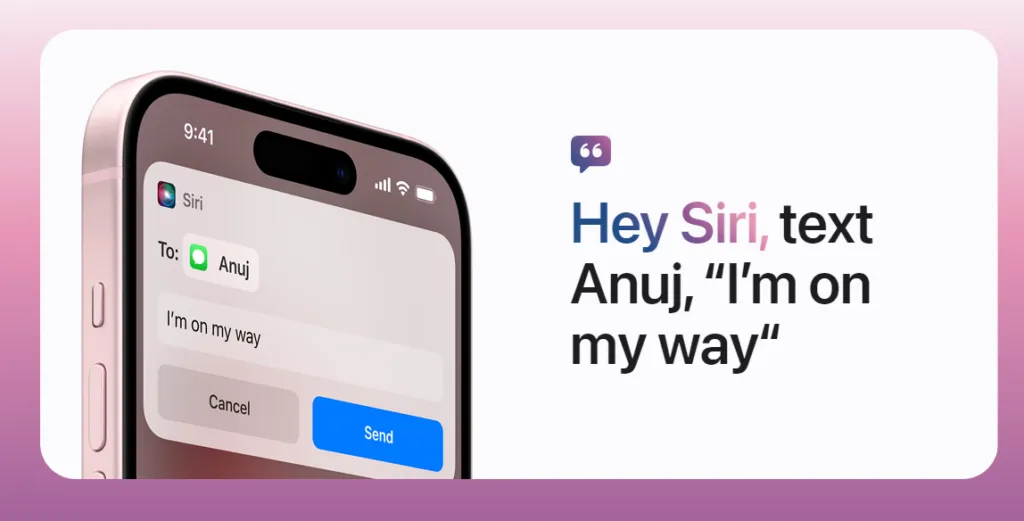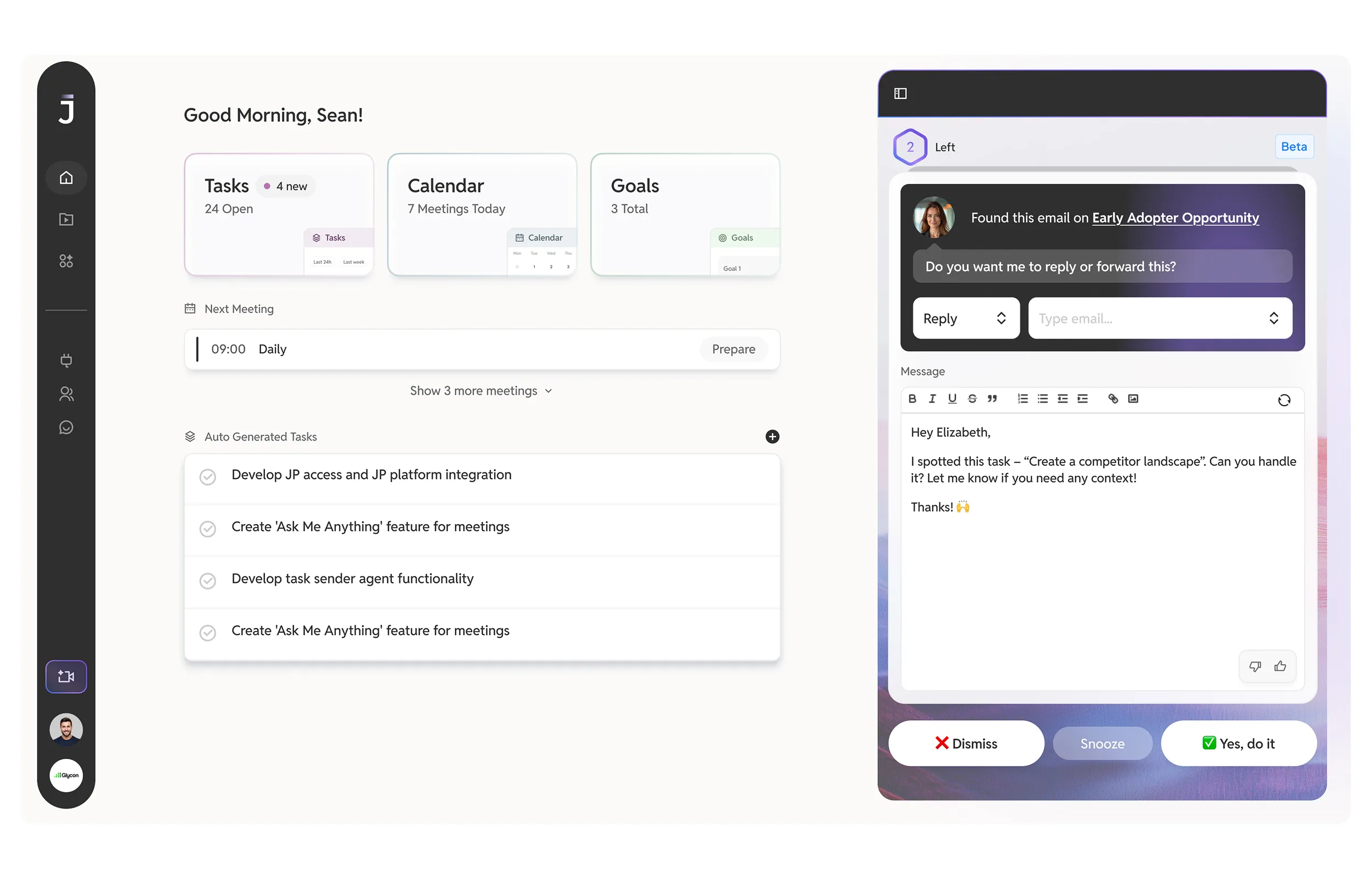The Difference Between AI Agent and AI Assistant Explained Simply
.webp)
AI is everywhere these days. Whether it’s helping you set a reminder on your phone or powering smart systems at work, AI is changing the way we live and do business.
But here’s the thing: not all AI is the same.
Just take AI agents vs AI assistants, for example. While their names sound strikingly similar, they couldn’t be more different.
You can think of them as part of your team. Assistants handle tasks you ask for, like managing your schedule or booking dinners. Meanwhile, agents work behind the scenes, spotting opportunities and taking action without needing your input.
Understanding this difference can help you choose the right AI tool for your needs – helping save time, cut down costs, and boost productivity.
In this article, we’ll break down the difference between AI agent and AI assistant, what they do, where each shines, and how to decide which one fits your goals.
What Is an AI Agent?
AI agents are software systems that use artificial intelligence (AI) to actively pursue goals and complete tasks on your behalf, often without waiting for direct input.
Unlike AI assistants, which rely on user commands, AI agents operate with greater autonomy. They can make decisions, plan ahead, adapt to changing conditions, and learn from experience.
Instead of just following instructions, AI agents figure out the best way to get things done, even across complex, multi-step workflows.
This makes them ideal for managing ongoing processes, juggling priorities, and optimizing results without constant oversight.

How AI agents work
AI agents might feel like magic, but there’s a lot going on under the hood.
Here’s a peek at how they operate behind the scenes:
- It learns and improves: With each cycle, the agent collects feedback: tweaking its plan, improving performance, and handling more complexity over time.
- A goal is defined: Let’s say your business wants to monitor competitors and flag product changes. You don’t tell the AI agent how to do it, just what outcome you’re after.
- The agent creates a plan: Using its reasoning and planning abilities, the agent figures out the steps: scan websites, extract updates, compare with existing data, and generate a summary.
- It executes and adapts: The agent gets to work. If a website changes layout or data is missing, it adjusts its approach and continues toward the goal.
Key features
AI agents come loaded with powerful capabilities that let them work independently, make smart decisions, and handle complex tasks, all to keep your workflow moving smoothly and efficiently:
- Autonomous decision-making: AI agents don’t wait for instructions. They assess situations and choose the best actions to meet goals.
- Goal-oriented planning: They map out multi-step strategies to complete complex tasks and projects effectively.
- Learning and adaptation: AI agents learn from experience and adapt to changing conditions without needing constant input.
- Memory and context retention: They remember past interactions and context over longer periods to make smarter decisions.
- Proactive task management: AI agents identify bottlenecks, delegate tasks, and send reminders to keep everything on track.
- Cross-team coordination: They facilitate communication and project execution across departments and stakeholders.
- Real-time insights and recommendations: AI agents analyze data continuously to suggest improvements and spot new opportunities.
- Customizable workflows: They adapt to your company’s specific needs and processes to deliver tailored support.
Industry and domain expertise: AI agents can learn your industry, competitors, and specific business context to provide highly relevant guidance and decisions.
Benefits of AI agents
If you’re a leader juggling priorities and looking for smarter ways to get things done, AI agents are your secret weapon.
AI agents are like a reliable partner who spots problems early, keeps projects on track, and clears the path for growth.
What Is an AI Assistant?
An AI Assistant, also called a Virtual Assistant, is a software created to respond to inquiries in a human-like manner, either through text or voice format.
At its core, AI assistants use artificial intelligence (AI) and natural language processing (NLP) to understand your requests, and respond in a way that feels natural.
They help perform routine tasks, like setting reminders, finding information, and handling customer support.
It’s a lot like having a human assistant by your side: you ask them to do something, and they get it done.

How AI assistants work
Behind that seemingly effortless interaction is some serious tech.
Here’s what’s happening behind the scenes:
- The user makes a request: For example, “Remind me to call Sarah at 4 PM.”
- The assistant interprets the request: Using natural language processing (NLP), it parses your sentence and identifies the key task (set a reminder) and details (who, when).
- The assistant responds and takes action: It sets the reminder and may confirm back to you with a quick “Got it, reminder set for 4 PM.”
While AI assistants wait for your command rather than acting on their own, they still help you save time, stay organized, and lighten the mental load of everyday tasks.
Key features
AI assistants pack a range of capabilities that work together to make interactions smooth, efficient, and personalized. These features allow them to understand you better, perform tasks quickly, and adapt to your needs.
- Natural language understanding: AI assistants interpret everyday speech or text, grasping the intent behind your words.
- Task execution on demand: They perform specific actions you request, such as setting reminders or sending messages.
- Conversational interaction: AI assistants engage in natural back-and-forth conversations for smooth communication.
- Prompt-driven operation: They wait for your commands and don’t act without your input, keeping you in control.
- Context awareness (short-term): AI assistants remember the current conversation context to respond accurately.
- Integration with services and devices: They connect to apps, calendars, and smart devices to carry out tasks seamlessly.
- Personalization: AI assistants learn your preferences over time to provide a tailored experience.
- Continuous learning and improvement: Ongoing updates and user interactions help AI assistants improve accuracy and capabilities.
H3: Benefits of AI assistants
Did you know that nearly one-third of businesses (32.9%) have already started replacing some human tasks with AI assistant solutions?
From boosting productivity to enhancing customer experience, these smart tools are transforming the way companies operate and compete in today’s digitalized market:
Limitations
AI assistants are powerful tools, but they’re not without their limitations.
Knowing their limitations helps you set realistic expectations and ensures smooth collaboration between humans and AI.
Here’s where AI assistants still fall short:
- Dependence on clear input: AI assistants need precise, well-defined commands. If your request is vague or unclear, they might get confused or deliver the wrong result.
- Limited context awareness: While they handle short conversations well, AI assistants struggle with long, complex interactions or multi-step tasks without repeated guidance.
- No true understanding or creativity: AI models work by recognizing patterns. They don’t genuinely “understand” your request or come up with creative solutions on their own.
- Risk of errors: They’re not infallible. AI assistants can misinterpret commands or give inaccurate information, so human oversight is still crucial for some tasks.
- Privacy and security concerns: Sharing sensitive data with AI tools raises privacy issues. It’s vital to have strong security measures in place when deploying AI assistants.
- Limited proactivity: Unlike AI agents, assistants typically won’t take initiative; they wait for your commands and don’t act independently.
While AI assistants offer powerful support, their reactive nature means there’s room for smarter, more autonomous solutions.
Summary: The Difference Between AI Agent and AI Assistant
We’ve covered a lot about how AI agents and AI assistants operate differently. But let’s see them compared side-by-side to bring it all together:
Real-World Application: AI Agent vs AI Assistant
AI assistants and agents might both be AI, but they shine in very different ways depending on the task at hand.
Here are a few examples of how each can possibly fit into the real world:
Customer experience
AI assistant:
- Handles common support tasks like answering FAQs
- Helps users navigate self-service options
- Escalates complex issues to human agents when needed
Delivers fast, reliable answers anytime
AI agent:
- Analyzes customer behavior in real time
- Proactively suggests personalized product recommendations
- Resolves complex problems independently
- Adapts to customer needs for a smoother, more engaging experience
Finance
AI assistant:
- Manages routine tasks like scheduling appointments
- Provides account balances and answers basic financial questions
- Keeps customers informed and operations running smoothly
AI agent:
- Detects fraud before it happens
- Monitors suspicious transactions and adjusts security protocols automatically
- Analyzes market trends and rebalances investment portfolios without human input
Healthcare
AI assistant:
- Sends appointment and medication reminders
- Helps patients schedule visits
- Offers easy access to medical records
- Reduces administrative hassle and improves patient engagement
AI agent:
- Assists with diagnostics and recommends treatment plans
- Adjusts care protocols based on patient data and outcomes
- Supports faster, more accurate, and personalized healthcare
HR
AI assistant:
- Coordinates interview scheduling
- Helps onboard new hires by providing resources
- Answers common employee questions
- Streamlines HR processes
AI agent:
- Analyzes large talent datasets to identify top candidates
- Optimizes recruitment strategies
- Monitors employee engagement trends
- Supports data-driven workforce planning and performance management
Smart homes and personal life
AI assistant:
- Responds to voice commands
- Manages smart devices, plays music, sets reminders
- Handles daily routines seamlessly
AI agent:
- Optimizes energy use based on your habits
- Manages home security systems proactively
- Anticipates needs for a more comfortable, efficient living space
Which AI Is Right for You?
When it comes to AI, one size definitely doesn’t fit all. The right choice depends on your business needs, the complexity of your processes, and how much autonomy you want your AI to have.
You need an AI assistant if:
- You want to automate simple, repetitive tasks like scheduling meetings, answering FAQs, or managing reminders
- Your focus is on improving day-to-day efficiency without changing how decisions get made
- You prefer a tool that waits for your commands and supports your team reactively
You need an AI agent if:
- You want to go beyond automation and empower your business with proactive decision-making that adapts and evolves
- You’re facing complex workflows, multi-step processes, or need ongoing optimization without constant supervision
- You need an AI that thinks ahead, identifies opportunities, detects risks like fraud, and drives strategic initiatives automatically
- Your goal is to boost productivity at scale, reduce operational overhead, and unlock insights that fuel smarter business decisions
AI Agent in Action: Journey AI
You’ve weighed your options, and an AI agent is the clear winner for your business needs. But what does that actually look like in practice?
Let’s walk through how Journey AI steps in to make your meetings smarter, your team more aligned, and your workday a whole lot easier:
- AI note taker: No more frantic note-taking. Journey automatically transcribes your meetings, pulls out the highlights, and even creates action items, so you never miss a thing.
- Meeting preparation: Show up ready. Get context, agenda suggestions, and relevant docs before every meeting, making conversations way more productive.
- Smart AI agents: We have more than one agent to help you out. They’ll handle the busywork (drafting emails, following up on tasks, summarizing meetings), freeing you up for the work that matters.
- Quick actions: Make decisions faster with one-click suggestions for next steps and task creation right after meetings.
- Seamless integration: Works smoothly with your existing tools like HubSpot, Salesforce, Slack, Gmail, and more. No disruption, just better flow.
- Institutional knowledge: Builds and keeps your company’s knowledge alive by capturing insights from every meeting and interaction.
- Custom templates: Save time with standardized meeting processes and automated follow-up workflows, especially handy for recurring meetings.
- Personalized learning: The more you use it, the better it gets. It learns your style and preferences to make every interaction feel natural.
- Task management: Automatically turns meeting takeaways into tracked tasks so nothing falls through the cracks.
- Continuous improvement: New features and updates keep Journey sharp, efficient, and aligned with your evolving needs.

The Future of AI Systems in Business
With 96% of organizations planning to increase their use of AI agents within the next 12 months, the path forward is unmistakable.
AI assistants have simplified everyday tasks, but AI agents are driving the next wave of transformation. They think ahead, make decisions, and take action, all without waiting for instructions.
This shift is opening doors to greater efficiency, smarter innovation, and stronger competitive edges across industries.
So, now that you understand the difference between AI agents and AI assistants, are you ready to join the AI agent evolution?
Frequently Asked Questions
An AI assistant primarily helps with specific tasks like scheduling, reminders, and note-taking, acting as a digital helper. An AI agent is more advanced, capable of managing complex workflows, automating repetitive tasks, and adapting to your business’s unique needs.
Any business looking to save time on administrative tasks, improve meeting productivity, and keep teams aligned will benefit. It’s especially useful for companies with frequent meetings, complex workflows, or remote teams needing better coordination.
AI agents go beyond saving time. They ensure follow-through, accelerate decision-making, reduce human error, and boost accountability - directly improving revenue operations, customer satisfaction, and team productivity.
AI agents can often be configured with custom workflows, templates, and logic to match your company’s rhythm, especially valuable for enterprises with complex or regulated operations.
Yes. By automating repeatable processes and ensuring seamless knowledge transfer, AI agents can make your existing team far more productive, scaling output without proportional hiring.






